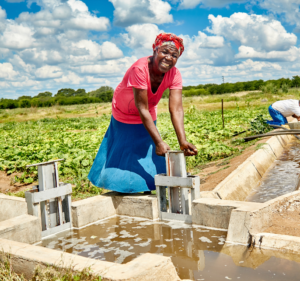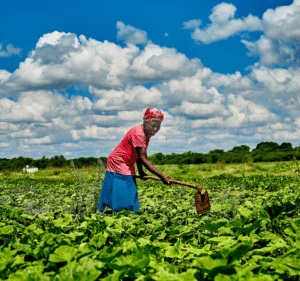Al Richardson, Head of our Impact and Learning team, talks to us about how Practical Action is always looking for ways to improve what we do, for the benefit of the communities we work with.
How is learning important to Practical Action? 
It’s vital that we are constantly learning and developing, always moving forward and improving. Learning isn’t just an activity for us – it’s a culture.
We look for opportunities to learn from our experiences, and the experiences of others. We also make sure we share everything we learn – within Practical Action, and with our partners and others, so that everyone’s understanding and capabilities are increased.
At what stage does the learning happen?
Learning is baked into every stage of the project: before, during and after. For example, before we began working with farmers in Zimbabwe to find a way to beat ongoing droughts and create a decent income, we needed to fully understand the problem and all the factors involved. We spent time talking to and learning from the community.
We discovered that new climate resilient farming skills alone wouldn’t be enough to solve the challenges they faced. Once they were able to grow abundant crops, they would also need to sell the surplus produce for an income. That meant looking at the local markets and seeing what opportunities were available to farmers. Where those opportunities didn’t exist, we helped create them, facilitating conversations between farmers and everyone involved in the market chain, so that together they could create a solution that benefits everyone.
How do you learn during a project?
Throughout a project, we build-in time for reflection, and see if there are aspects we need to adjust. We plan very thoroughly before a project begins of course, so I’m not talking about making a 180-degree turn mid-way! But sometimes unforeseen circumstances pop up, and we need to adapt.
With our Renewable Energy for Refugees project in Rwanda, we spent time with communities designing the project, but then once the work had begun, we learned that while some things were working well, there were also some new challenges to consider, which we couldn’t have anticipated. The project involved working with renewable energy companies who came into the refugee camps to help set up the energy solutions. But these private sector companies each had their own ways of working, and so we needed to do a bit of adapting along the way, discussing and discovering what were the win-win solutions for the communities and the companies.
 And how about learning after the project is complete?
And how about learning after the project is complete?
Yes, it’s also vital that what we learn on one project is used to inform other ongoing and future work around the world. So we’re in constant conversation with colleagues in other countries, sharing and joining up our thinking. Of course, that sharing extends out beyond our own teams, to other organisations and governments. We want others to benefit from our work and spread the solutions as far and wide as possible. It’s our “big change starts small” principle.
A great example of this is our plastic waste recycling initiative in Bangladesh. After working with one community to turn plastic waste into profit, our solution has now been picked up by the government of Bangladesh. They are making plans to roll it out to other cities, meaning many more people benefit. Sharing what we learn is how we ensure our solutions have the biggest possible impact.
What’s the most important thing you’ve learned in your role?
The most important thing is that development is about feeling our way forward. None of us knows everything, and we’re constantly working in new locations, under new conditions, and with new challenges. By using all our expertise and skill, we listen and plan with communities, and we test out solutions. We improve through trial and error, iterating and innovating. It’s an ever-evolving journey, and it is great to have supporters who are keen to walk alongside us.